Alumni of Flow House looking back on their semester in Vienna say it changed them. Some returned to Wake Forest with new visions for their lives and careers. Many gained an understanding of cultural differences — while recognizing the core similarities of human beings. They discovered they were stronger than they thought. Many made lifelong friends. A few found love that led to marriage. They all had fun.
Several alumni who attended Flow House’s 25th anniversary celebration in Vienna shared their insights with Wake Forest Magazine, as did faculty members who taught them.
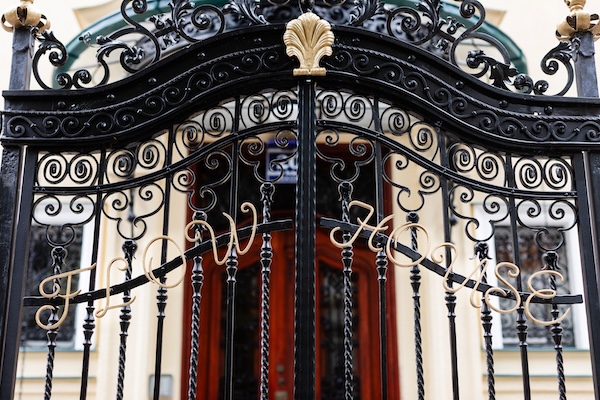
The sound of music
Erica Fedor (’13)
When Erica Fedor (’13) arrived at Flow House for the spring semester of 2012, she was already primed for the City of Music.
A double major in English and music who plays piano and cello, Fedor found herself “in heaven” during her semester in Vienna and on trips to Prague and other cities infused with music.
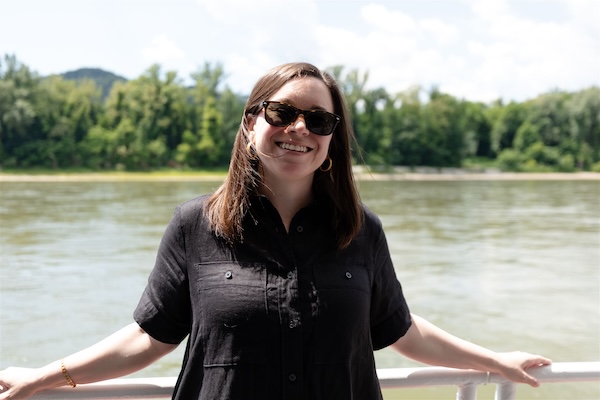
Central Europe was where Fedor, who has a master’s degree in ethnomusicology and a doctorate in musicology, discovered her scholarly focus: the power of music and artist exchanges to support American cultural diplomacy, from jazz ambassador tours during the Cold War to modern hip-hop musician exchanges.
“There are these moments where (music) really can transcend nationality in meaningful ways and allow people to connect in ways that aren’t possible in other areas,” says Fedor, who won a Fulbright scholarship to teach in the Czech Republic. At UNC School of the Arts in Winston-Salem, she taught music history, culture and theory. She recently moved to the Boston area and does coaching and editing for students applying to all levels of higher education, including medical and law school. She also teaches university classes part time.
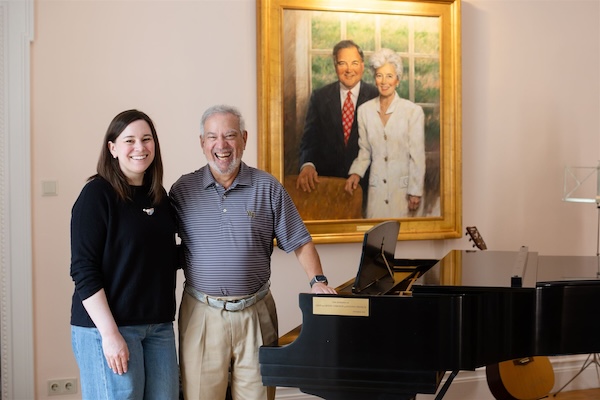
Fedor recalls that some students with little exposure to classical music felt nervous and uncertain at concerts required for Flow House music courses. By the end of the semester, at a concert of works by Austrian composer Anton Bruckner, “I remember looking down the line and just seeing all of us nodding our heads and really getting into the music,” Fedor says.
Becoming Viennese
William McKay (’20)
William McKay (’20) loved Vienna during his spring 2018 semester at Flow House — so much that he now lives and works in the city.
He was hired in October 2023 as an associate recruitment officer for the International Atomic Energy Agency based in Vienna. The organization, part of the United Nations system, promotes peaceful use of nuclear energy and verifies countries’ adherence to the international Treaty on the Non-Proliferation of Nuclear Weapons.
McKay started life as an international baby, born in London while his parents were working there. They moved back to the United States when he was 3, and he grew up in Stamford, Connecticut. With chronic wanderlust, he explored afield for college. He says Wake Forest, with its “stunning campus,” was “the perfect size for me, where you could know a lot of people, but not necessarily know everyone.”
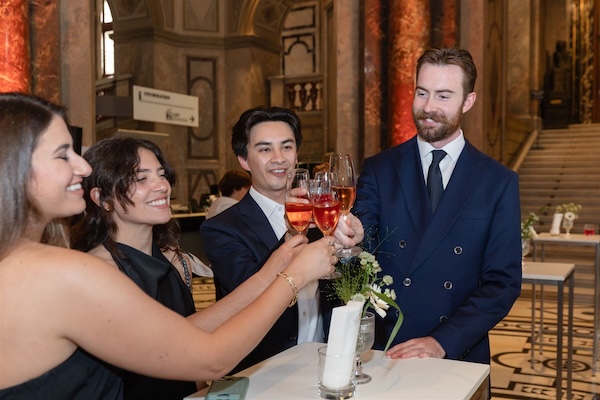
He wanted to study abroad, as his older brother and sister had through other universities. He recognized the value of Wake Forest’s seamless approach to getting students to Vienna and integrating courses for credit. He double-majored in German and business and enterprise management.
He won a Fulbright scholarship to teach English in Germany after graduation, but the pandemic delayed his Fulbright year until 2021, and his time was extended for a second year.
His advice to students who study abroad? Get to know Vienna or wherever you are based.
“Really, really make the most of the place that you’re going. Travel, of course, but don’t forget that you’ve traveled abroad to a place to experience it, and really dive deep into the culture.”
Appreciating culture as a future doctor
Zachary Bokhari (’24)
Zachary Bokhari (’24) has always known he wanted to be a doctor. His parents are physicians, and his sister is in medical school in Massachusetts. This summer, Bokhari began his first year at Rutgers Robert Wood Johnson Medical School in New Jersey, planning to focus on surgery.
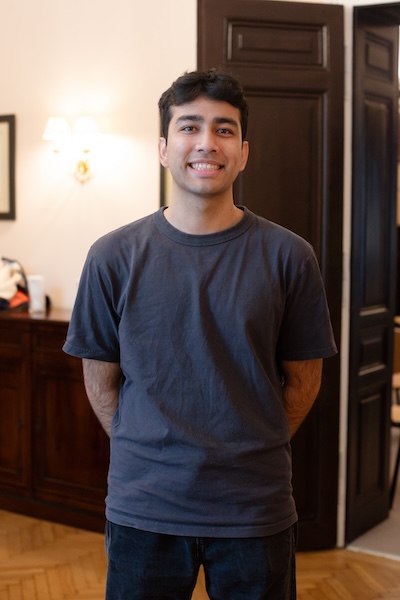
He had always been told that study abroad would interfere with the time needed to complete a demanding pre-med curriculum, but class credits at Flow House opened the door to his spring semester there in 2022. A psychology course contributed to his psychology major, and credit for courses in German allowed him to expand his German minor to a double major. He was still able to finish pre-med requirements while also assisting the Wake Forest men’s soccer team with health and athletic training.
To achieve this time-intensive feat, he had to take a long hiatus from Pokémon Trading Card Game tournaments. In high school, he won the 2017 World Trading Card Game tournaments, reaching the summit of a Pokémon career begun at age 5 when his 13-year-old brother taught him the game. Since young Zachary couldn’t read yet, he memorized the purpose of hundreds of cards that he and opponents strategically chose for their 60-card decks.
Pokémon introduced him to the art of strategy and analysis, helping him see the benefits of the three stages of his Central Europe experience. Being surrounded by Wake Foresters at Flow House was “the perfect entry … because everything else kind of remains the same, except for the culture shock, which is great, because then you can really experience it and feel it and learn from it.”
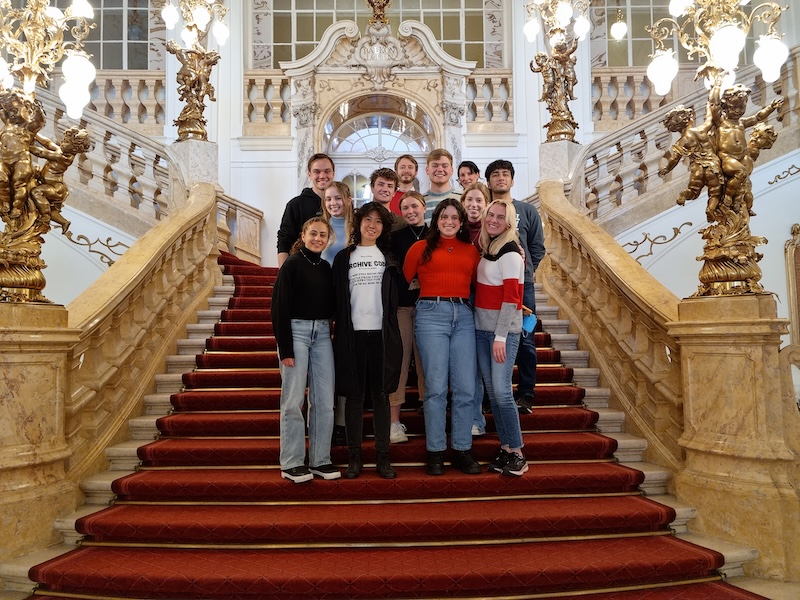
Stage 2 in cultural immersion was living with a family in Germany and communicating primarily in German during a monthlong summer program with Associate Professor of German Grant McAllister (P ’26), now Flow House program director.
Stage 3 was a Fulbright scholarship after graduation, teaching English to German middle and high school students for a year. “I was now living 100% by myself in a foreign country, dropped in a small town … and full culture shock for, like, 10 months.”
He wouldn’t change a thing. Each more demanding environment taught him that his discomfort led to growth, new cultural understanding and the confidence to work through the challenges. That, he says, can make him a better doctor.
Love and marriage
Henry Hollis (’21) and Margaret “Maggie” Gregor Hollis (’21)
Just before their first wedding anniversary in June, Henry Hollis (’21) and Maggie Gregor Hollis (’21) returned in May to the scene of their romantic beginning. Although they had never connected in Winston-Salem beyond having engineering classes together, they began dating during their fall 2019 semester at Flow House.
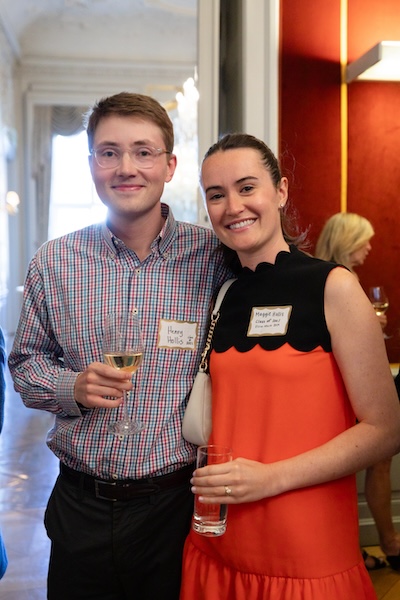
Besides finding their soul mates, they each made big leaps during the semester. Henry, a native of Winston-Salem, says his time at Flow House “was literally the first time I had been away from home for more than maybe a week.” He leaned in and loved it. Maggie, also nervous about a big move, leaned in even more — taking a skydiving leap in Interlaken, Switzerland. For her parents’ sake, she sent a photo after the fact rather than letting them worry ahead of time.
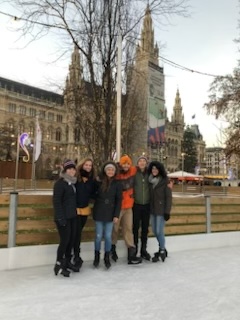
The couple now lives in Philadelphia. Maggie, a Pennsylvania native, works in sales for General Mills. Henry, the son of Thomas Hollis (P ’19, ’21), a biochemistry professor at Wake Forest School of Medicine, is pursuing a graduate degree in biomedical engineering at Drexel University.
A quarter century at Flow House
Günter Haika, retired after teaching and directing house operations
Günter Haika is a native of Vienna, with a dry, intellectual sense of humor that has a playfully sarcastic edge. He tells deadpan jokes that can take a few seconds to land before evoking an irresistible laugh. It’s no wonder that Günter, as everyone calls him, comes up repeatedly as a favorite of Flow House alumni. He retired in July after teaching students there from the program’s inception in fall 1999. He taught German, Austrian literature and film, photography and other topics. He later also took on the role of what is now called on-site director.
Zachary Bokhari (’24), who studied at Flow House in spring 2022, calls Günter “an amazing guy.”
“He really cares about the students and about making sure that they understand Viennese culture. He was just really funny in unconventional ways.”
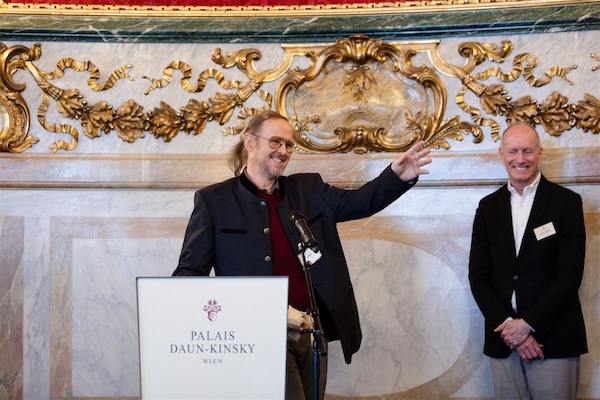
Günter says he approached his literature classes as a discussion. “I learn as much from them as they do from me. … I never tell them what to think about a piece of literature, but I let them tell me what they think. And then we discuss it.”
Mandy Emery (’13, MA ’18), a bit homesick during her spring 2011 semester at Flow House, didn’t fully understand what Günter meant when he told students, “You are all Viennese!”
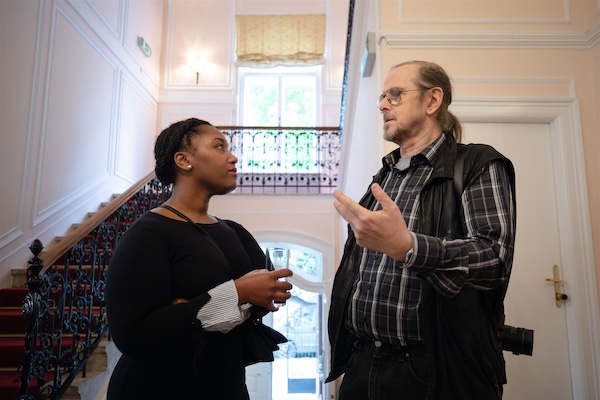
“Having come back (for the anniversary), I understand what Günter meant now and then,” Emery says. “Vienna is not just a place that you visit; it is a place you can never forget. Günter is the kind of person that you do not just meet, … you do not forget.”
Watching students grow
Martina Anghel, on-site director
Martina Anghel, who came to Flow House in 2018 as a German instructor and later was associate on-site director, succeeded Günter Haika in overseeing the house operations. Besides teaching and helping to manage Flow House, she played a key role in the recent refurnishing and updating of the villa.
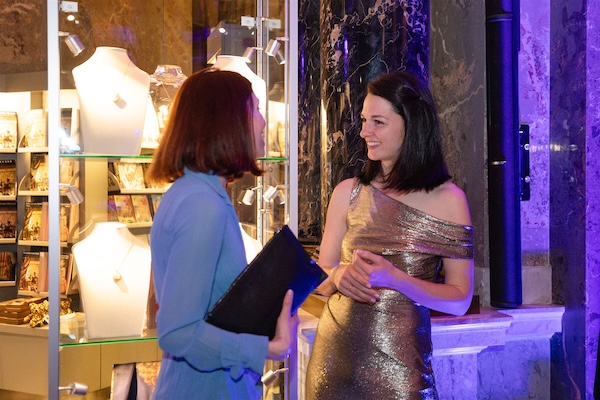
Anghel says students often arrive uncertain and leave confident, having navigated gym classes, doctor’s visits and haircuts — in German. She especially enjoys reading students’ post-semester reflections acknowledging their growth, from how to fry an egg to how to navigate conflicts. “Almost everybody came away feeling like they knew they could do more than they thought they could do,” she says.
Mariela Salchinger is associate on-site director. Housekeeper Snjezana Kraljic, with Flow House from the beginning, takes care of all who live and work there.
The honored “Dr. O”
Beatrice Ottersböck
Flow House alumni and faculty revere Beatrice Ottersböck, known as “Dr. O,” says retired program director Rebecca Thomas (P ’04, ’12).
Ottersböck taught the history of art and architecture at Flow House until she retired during the COVID-19 pandemic because, “Well, I was 85.” She adds that the pandemic didn’t allow for a critical part of her teaching — touring museums and cathedrals with students in Vienna and on group visits to other cities. She says she is grateful to the first Flow House program director, Professor Emeritus of German Larry West, for hiring her in 1999.
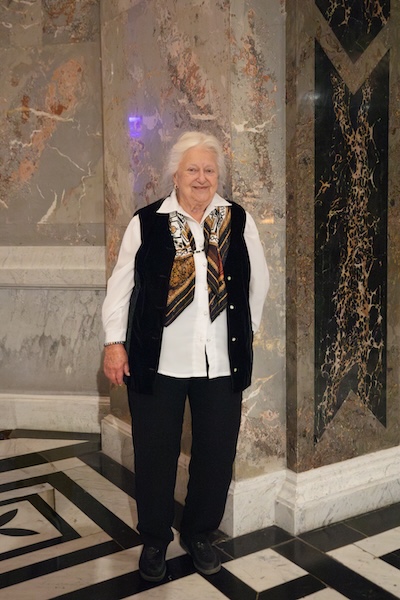
When Ottersböck’s father, physics professor Alois Langer, accepted an invitation to a scientific exchange program in the United States, he and his wife, Bozena, a geology researcher, decided she would stay home because she was pregnant with Beatrice. Soon after he left, Bozena Langer learned that Hitler’s military was headed to what was then Czechoslovakia. She stood in line for hours to get a gas mask the day before her daughter was born.
When Beatrice was 3 years old, her father finally won permission to bring his family to the United States. In 1941, her mother navigated with Beatrice through war-torn Europe to sail from Portugal to see her father for the first time. Beatrice grew up in Pittsburgh and earned U.S. citizenship.
After college, Ottersböck won a Fulbright scholarship for a year in Vienna. On a university club ski trip, she was so exhausted by her first attempt at skiing that a Viennese student instructor with the club was assigned to help her. He had to carry her skis up the mountain for her. They eventually married and raised their son and daughter in Vienna. Her husband died in 2002.
Ottersböck studied art history for seven semesters at the University of Vienna and painting at the Academy of Fine Arts Vienna. She specialized in medieval art and earned a doctorate from the University of Pittsburgh. She aimed to spark Flow House students’ interests beyond their major or career choice. “Intellectual curiosity is what I want to wake up in them,” she says.
During the Flow House anniversary celebration at the Kunsthistorisches Museum, guests viewing the art exhibits stopped to praise her. Some told her they still remember details of her museum tours. One guest said a friend considered Dr. O the best memory of Vienna and Flow House. “When you hear that you made a difference in students’ lives, it really warms the heart,” Ottersböck says.
Carol L. Hanner retired in 2024 after a newspaper career and nearly six years as managing editor of Wake Forest Magazine. She lives in Porto, Portugal.


